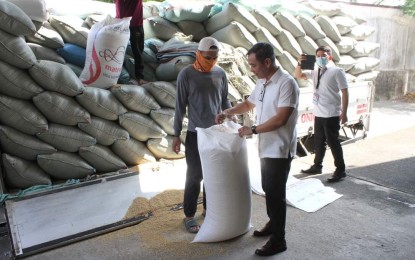
PALAY PROCUREMENT. National Food Authority (NFA) officer-in-charge Administrator Larry Lacson inspects the procured palay (unhusked rice) in an NFA warehouse in Bulacan on April 24, 2024. President Ferdinand R. Marcos Jr. said on May 6, 2024 that he would certify as urgent the bill proposing to amend the Rice Tariffication Law (RTL) and the NFA Charter to give the government the needed leeway to act when retail prices of rice go up. (Photo courtesy of NFA)
MANILA – Senator Robinhood Padilla on Wednesday filed a bill seeking to amend Republic Act No. 11203 or the Rice Tariffication Law (RTL) by enhancing the powers of the National Food Authority (NFA) in managing the country's rice supply chain to stabilize the price and supply of rice and provide Filipinos access to cheaper rice.
Senate Bill No. 2672 supports President Ferdinand R. Marcos Jr.’s call to amend the RTL and the NFA Charter to provide the national government with control over the local rice market.
"The present amendatory bill seeks to restore the NFA's role in managing the country's supply chain. With the renewed and strengthened mandate of NFA in the amendatory bill, the stabilization of the price of rice will be guaranteed and supply functions will be regulated. Ultimately, access to cheaper rice will be more feasible for poor Filipinos," Padilla said in his bill.
The proposed measure also seeks the creation of a Rice Industry Development-Program Management Office (RID-PMO) to ensure a holistic approach and improve collaboration of rice-concerned agencies and industry players.
Under SB 2672, the NFA shall require registration of all grains warehouses and maintain a national database of such registrations; inspect warehouses as necessary to ensure compliance with standards related to rice quality and supply; and collect and analyze data on rice trade activities for informed policy and operational decisions.
Meanwhile, the Agriculture Secretary may declare an emergency upon the recommendation of the National Price Coordinating Council or Local Price Coordinating Council due to shortage in the supply of rice; sustained increase in the price of rice; or extraordinary increase in the price of rice.
Existing inventory may also be used by the NFA to supply areas where extraordinary price increases or acute shortages of rice occur; and replenish the inventory used from available sources.
The proposed measure also authorizes the NFA to purchase local milled rice or a percentage of the rice brought in by accredited importers - as necessary.
As a final recourse, the NFA shall be granted authority to directly import rice “subject to explicit authorization from the President - solely in circumstances where domestic supply deficits necessitate such imports to stabilize the national rice supply and maintain optimal buffer stock."
Meanwhile, the Bureau of Plant Industry shall impose appropriate fees and measures for low and non-utilization of Sanitary and Phytosanitary Import Clearance (SPSIC) to ensure the timely arrival of imported rice.
BPI shall be authorized to inspect warehouses where local market players and importers store or keep milled rice. The DA Inspectorate and Enforcement shall be authorized to assist BPI in conducting regular and unscheduled inspections.
SB 2672 also seeks to extend the validity of the Rice Competitiveness Enhancement Fund (RCEF) for another six years, and increase its annual appropriation to PHP15 billion to further improve Filipino farmers' competitiveness and income.
The Fund's mechanization component shall also be expanded to include constructing and improving postharvest and processing facilities, and its credit assistance component operates as a revolving fund for loans to eligible beneficiaries.
"This bill also recommends the creation of the Rice Industry Development - Program Management Office to ensure a holistic approach and improve collaboration and convergence of rice-concerned agencies and industry players," Padilla added.
The bill also seeks to utilize excess tariff revenues from the Crop Diversification Program for rice-based crop diversification training, postharvest machinery and facilities, seeds and fertilizers assistance, solar power irrigation, and small water impounding systems. (PNA)
